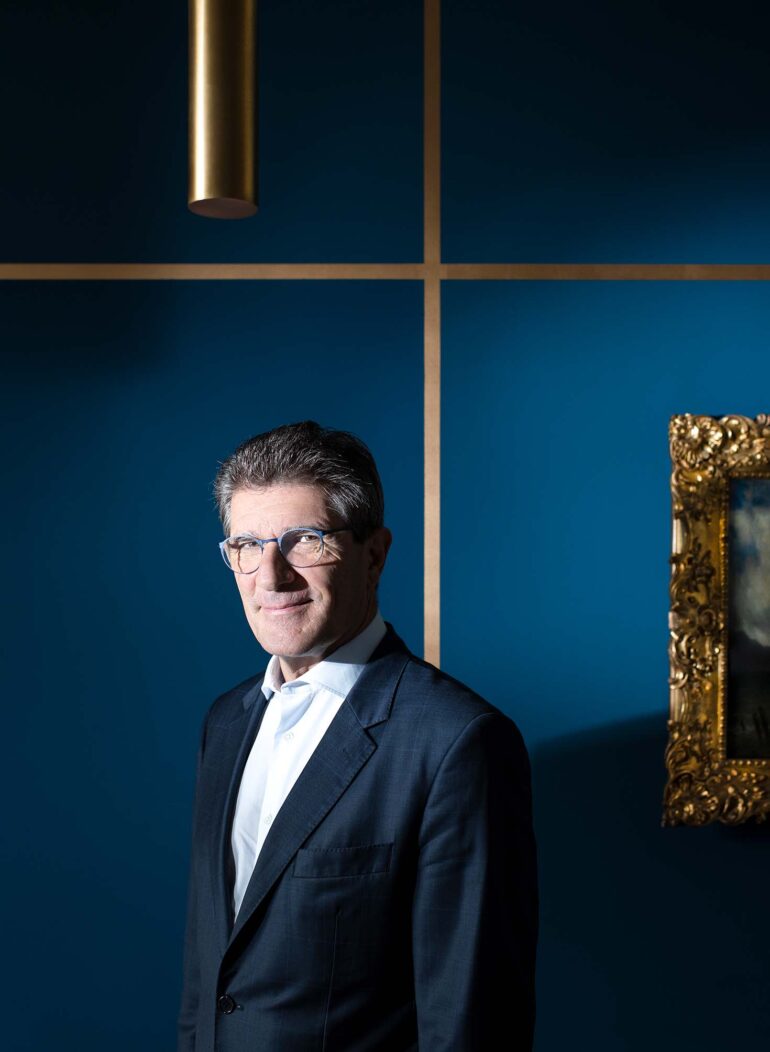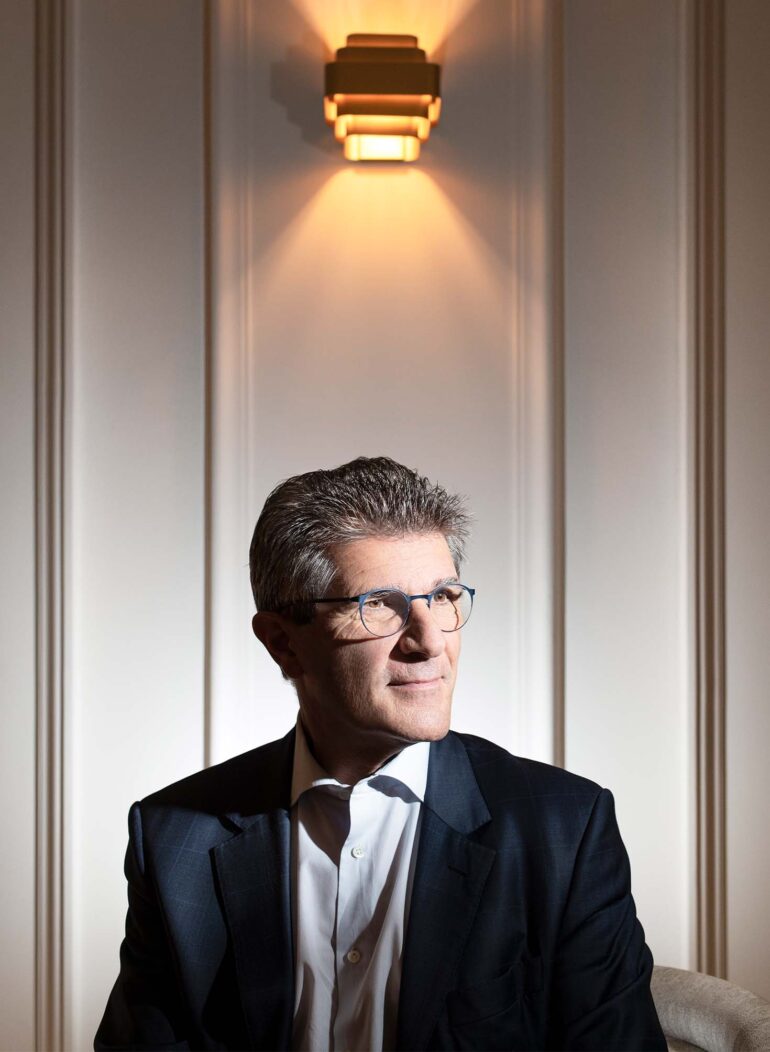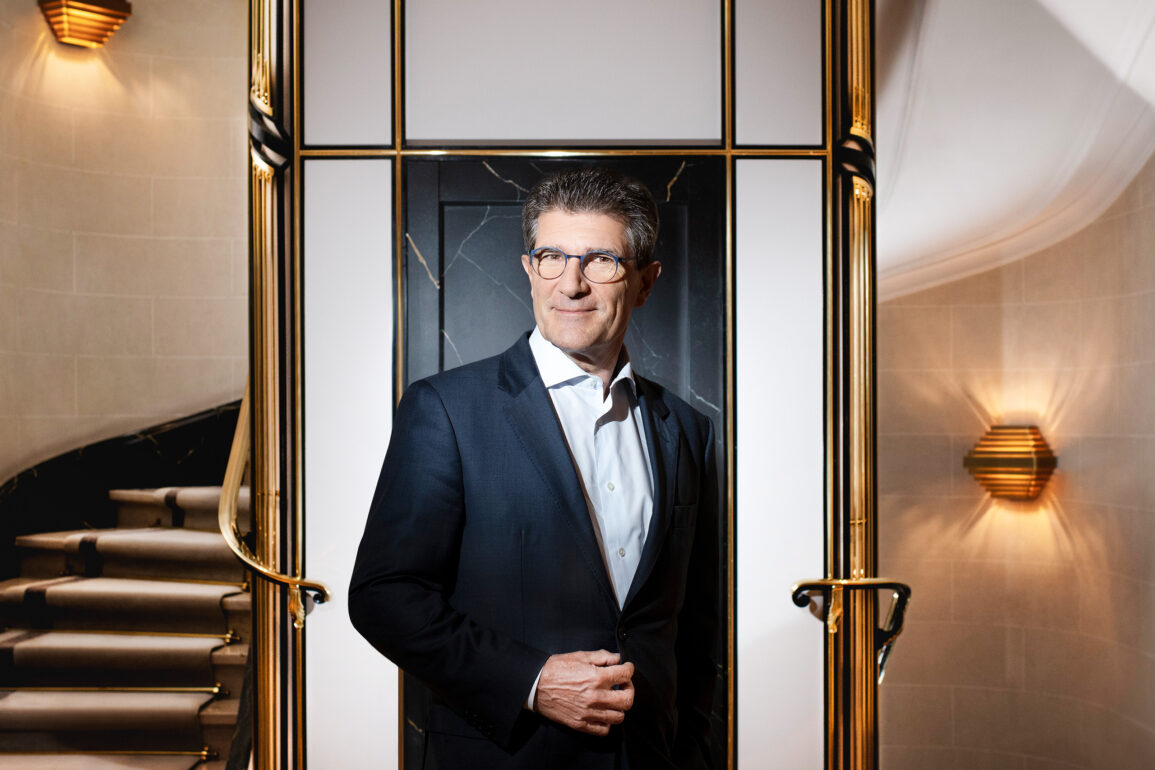Patrick Odier is Senior Managing Partner of the private bank Lombard Odier & Cie SA, and President of the Board of its corporate foundation, Fondation Lombard Odier. He is the sixth generation to stand at the helm of his firm, founded in 1796, representing the bank’s traditions and family values.
The Philanthropist: Is philanthropic engagement part of a company’s responsibility to society?
Patrick Odier: They are connected, but should not be confused. Our bank, like any company, must achieve a result that allows it, and its services, to develop. Its objective is profitability. As a company, we are responsible for maintaining people’s jobs. When it comes to philanthropy, we have a vocation that is not necessarily reflected in financial returns. We facilitate projects that would often not be realised without philanthropic contributions.
Is philanthropy one of Lombard Odier’s values?
It’s part of our DNA in the sense that we want to be involved, to contribute and to have an impact.
Is this desire present throughout the whole company?
As a company that is run and owned entirely by its Managing Partners, our Bank has a strong focus on the human factor. Responsibility towards our society and the ecosystem in which we operate is important to us. This sense is probably stronger in a privately held company than in a listed corporation. This responsibility is part of our philosophy, and we have formalised it by developing, for example, our offering in the field of sustainable finance and by becoming a B Corp certified company. Philanthropic thinking runs throughout our entire company. It is important when advising clients and it is also important for our employees, so they can identify fully with these values.

Photo: Fred Merz
How do you manage this?
We have developed tools that allow us to mobilise the company’s resources. In turn, employees are encouraged to develop philanthropic projects. They know that the Maison has the skills and the means to implement them.
What is the significance of your family?
In our family, as in any family that has founded a company, certain causes are favoured depending on the interests or skills of the family members in question. Some are very keen on humanitarian work; others focus on the sciences or social issues. These varying focal points can be found across every generation of the family. Each has their own concerns, shaped by their environment and personal sensibilities.
«Philanthropy is giving back to society.»
Patrick Odier
What dominates today?
Through the Fondation Lombard Odier, we created a two-year programme to support the arts during the Covid-19 pandemic, with a focus on Swiss cultural institutions in locations where the Group has offices. We are active in terms of migration, too. This area has always faced challenges, but they have become more acute recently. Alongside humanitarian aid, our corporate foundation is involved in education and training. We regularly have a concrete impact and breathe life into these values. In turn, our attitude encourages our employees.
Is this easier in a family-run company?
I think so, yes. We are four founding families and we are particularly aware of our responsibility towards society. Of course, the fact that we are directly in charge, as owners and managers, makes things easier. It’s a very effective way of transmitting our values.
Because you embody them?
Yes. Partners and employees are at the origin of our commitment. If they have a favoured cause, they can propose a project. We have also created a platform that empowers employees to discuss their experiences and to take initiative. Our work during Covid-19 is a good example of spontaneous action.
What did you do?
With the Covid-19 Relief Initiative, we used our foundation to support global projects, such as those run by Médecins Sans Frontières in South Africa. We collaborated with Fundación La Caixa in Spain to provide meals to children in need when schools were closed, and also worked to distribute protective equipment such as masks. The challenge lay in obtaining them at a time when they were not readily available, so we joined forces with a group of manufacturers and were able to procure masks via a Swiss foundation active in China. The quality control company SGS tested them for us and Swiss Air provided a plane to transport them. This is corporate philanthropy, put into practice by people – we are able to mobilise our partners to philanthropic ends.
And you encourage other organisations to act through the Corporate Walk of Hope?
Fondation Lombard Odier provided start-up funding and incubation support to this project by Terre des Hommes Suisse. It’s based on the Walk of Hope, which has been running for three decades. At this event, children in Geneva take part in the walk to collect donations for children’s rights. The Covid-19 crisis interrupted this tradition, dealing a heavy blow to the Terre des Hommes’ resources. The Corporate Walk of Hope was launched in 2021 and employees are sponsored by their company to take part.
Do you often work with a network?
We work with a network of foundations. We do not want to reinvent the wheel: we are not experts on certain topics, so we seek out specialists.
What are the advantages of having your own foundation?
Sometimes just donating money is not enough. We have a long-standing relationship with the International Committee of the Red Cross (ICRC) and are a founding member of its Corporate Support Group. At a discussion several years ago with the ICRC president, we spent some time thinking about how we could combine our financial expertise with the ICRC’s humanitarian aid knowledge. The result was a new financial instrument: the Programme for Humanitarian Impact Investment (PHII), also known as the “Humanitarian Impact Bond”. It enables the construction and operation of physical rehabilitation centres in the Democratic Republic of the Congo, Nigeria and Mali. Fondation Lombard Odier provided start-up financing and supported the development of the bond, which is funded by private investors. We want to drive these innovative financial solutions even further forward, generating new resources for humanitarian and healthcare-related projects.
Does the fact that so many organisations are present in Geneva make your work easier?
Absolutely. People know each other. We can take the tram to the heart of the international organisations in 10 minutes. This Swiss concept of “International Geneva”, that is, the international nature of humanitarian aid and multilateral dialogue, is very important in order to be effective in this field. This concentration helps a lot.
«Sometimes it’s not enough to simply donate money.»
Patrick Odier
Is this why Geneva is such an attractive location for foundations?
It’s not just the number of these organisations that counts, but their quality. There are experts in Geneva in all kinds of areas, which is exceptional. There are not many topics we cannot deal with here.
You also support the Centre for Philanthropy at the University of Geneva.
Yes, with pride and enthusiasm.
Why are you engaged in philanthropic research?
Through our foundation, we are one of the Centre’s founding partners. We have always believed academic research to be particularly helpful in the field of finance. It brings necessary scientific accreditation to the domain of philanthropy, as well as to impact investing or sustainable finance. Philanthropy raises many questions: for example, how can one can efficiently and securely fund projects that are often very complex? To answer this question, we need tools that cannot be developed purely at a practical level without input from applied and theoretical research. There is equally no single, correct governance approach for a philanthropic organisation. Different models exist. Researching, developing and testing these models, step by step, is a task for the academic community. Then there’s the question of tax exemption, for example.
Meaning?
This is an issue with major leverage in the US, but less so in other regions. Certain groups are calling tax exemption into question. The thinking behind it is that only the rich are active in philanthropy, and there’s no reason why these people should be able to deduct their gifts from their taxable incomes. These thoughts bridge the divide between philosophy and academic research, between financial and fiscal arguments. They should be researched by a neutral body with expertise in this area, and that’s where the centre comes in. That said, it is important not to over-intellectualise the topic.
Is the role of philanthropy controversial?
The role of philanthropy must be debated. In itself, philanthropy is necessary – just because only a minority is able to donate is not a cause for fear or avoidance. On the contrary. I think that almost every one of us has the means to be a philanthropist. It’s not only a question of money: often, skills are what count. Many doctors travel to disaster-hit areas to donate their skills without receiving payment in return. People can be mobilised to do good. Philanthropy is about giving time, energy, skills and money to the community. But this is a crucial debate. What is the relationship between philanthropy and the state? We must consider them as linked entities, perhaps also in association with the role of sustainable finance.
How do you see this sector developing? Do you think the next generation will shift the values and focal areas?
No. Societal sensibility is doubtless much more evolved, but I don’t believe this is a generational question. Some topics mean much more to a particular generation, such as climate protection and the wasting of resources for example. Indeed, these topics will carry great weight for future generations, but they are also of concern to the current generation. This generational division seems less significant on these topics, but may be more pronounced in fields such as culture or technology.

How will the role of companies in philanthropy evolve?
Companies will take on a more important role as a way of sharing economic success, and they will increasingly do so with tools adapted to the purpose. This will result in a balance and a middle ground between the model of pure economic profitability and one that accounts for economic and social aspects. We are in the midst of this transition. Companies that give up part of their margins in the short term to implement sustainable practices are contributing to a redistribution of resources, which will be in their favour in the long term. I think this is a very desirable development. Philanthropy itself will also follow this trend. Some fields of activity will remain difficult to invest in because they are difficult to address or too specific, even though they may be interesting. These concerns will remain for philanthropic engagement. One challenge will be how to manage this engagement effectively. Numerous foundations focus on cancer research, for instance, but how can these resources be pooled better?
Will collaboration become more important?
Yes. But it’s important not to over-organise: we must remain pragmatic, efficient and agile, not investing too much in the organisation but ensuring that everyone has access to information.
New initiatives from civil society are championing their causes. Crowdfunding is offering new funding models. Is traditional philanthropy facing competition?
Taking about ‘competition’ when donating to good causes is not a good start. Instead, they should spur each other on: doing good knows no limits. What counts is how well we go about it. Some models are better adapted to certain circumstances than others, and they should not be compared. There’s no such thing as a bad example of philanthropic generosity, but it needs professionalisation; we need standards. At the same time, we must retain the spontaneity of these initiatives, as this spontaneity drives all kinds of developments. Many things would never have been possible without it. I have launched a crowdsourcing campaign with my children for a small public health infrastructure project. The ability to communicate information about a project to a broader audience is a major advantage. We have a responsibility to use this new technology and we should encourage this. Additionally, charitable organisations need these skills, so they can develop the reflex of using them.


